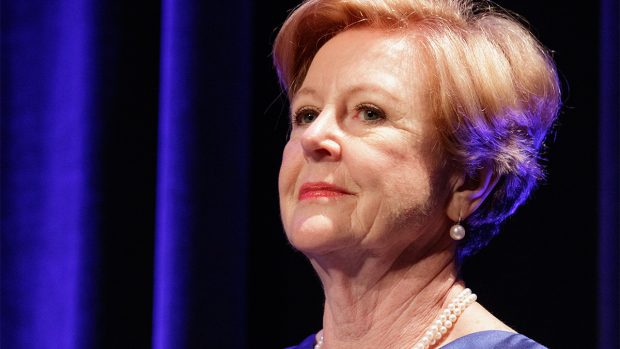 In the keynote address at the Brisbane Writer’s Festival in September, the novelist Lionel Shriver took aim at some of the prominent idiocies of the contemporary Left, namely political correctness and the politics of identity. For Yassmin Abdel-Magied, one of the more sensitive plants in the audience, the prospect of encountering an idea that challenged her worldview was simply too much to bear. She stormed out during Shriver’s throat-clearing introductory remarks.
In the keynote address at the Brisbane Writer’s Festival in September, the novelist Lionel Shriver took aim at some of the prominent idiocies of the contemporary Left, namely political correctness and the politics of identity. For Yassmin Abdel-Magied, one of the more sensitive plants in the audience, the prospect of encountering an idea that challenged her worldview was simply too much to bear. She stormed out during Shriver’s throat-clearing introductory remarks.
I highlight this incident to demonstrate the tremendous publishing opportunities available to writers and artists willing to parade their stupidity and ignorance as virtue. In an essay in The Guardian, Abdel-Magied described her unmannerly exit in excruciating detail and critiqued a speech that she had not even heard.
The Saturday Paper invites similarly fatuous submissions. Maxine Beneba Clarke wrote of her post-speech confrontation with Shriver in the hall-way, where heavy words like racist and disgrace were thrown around with unusual ease. Clarke, of course, didn’t think it necessary to attend the event in question. Her knowledge of the speech was based entirely on a casual scroll through the opprobrious remarks of her Twitter comrades.
A stern but sensible editor would rightly reject, say, a book review if the reviewer admitted that the book had remained unopened. No such editorial standards apply to the professionally outraged.
This is the style of intellectual engagement favoured by the Millennial Left: avoid, at all cost, knowledge of what your opponents say, but retain the confidence to criticise them for saying it. As I noted, this is a good career move. If you have a talent for narcissistic windbaggery à la Abdel-Magied, you’re well on your way to becoming a media star. Like her, you can be invited to burble regularly on ABC radio and ABC Q&A and ABC Drum and, well, you get the idea.
However, as Yassmin discovered, such a style has its limits. It exposes one, however briefly, to people and ideas that one might disagree with, and this is too great a risk.
The campus left, in Australia and abroad, has a few supplementary measures which have proved very effective. No-platforming, a recent addition to the student lexicon, refers to the attempt to protest and ultimately cancel speeches by controversial public figures. Last year, Cardiff University students launched a petition to rescind a speaking invitation to Germaine Greer, whose views on transgendered folk were thought to be too reactionary. Ayaan Hirsi Ali, the enemy of female genital mutilation, Islamism and other barbarisms, found herself unwelcome at Brandeis University. Her views, too, were deemed hateful and inappropriate.
On and on it goes. Last month, more than a few dolts at Sydney University tried this tactic out on John Howard, who was awarded an honorary doctorate and invited to address the graduating class. They were unsuccessful, and I wish them many political failures in the future. But it seems Australian universities are adopting the anti-intellectual methods of their American and British counterparts.
From 2017, Monash University lecturers will affix trigger warnings to course guides, so that delicate students can avoid potentially harmful material. In my hometown, Newcastle University has declared war on sexist and misogynistic words like Mr, Mrs and sportsmanlike, which have no place in our exciting era of gender fluidity. I would have to adjust the tone of that previous sentence if I ventured to the campus of Western Sydney University, where sensible administrators have banned sarcasm. I assure you, dear reader, that your leg remains unpulled.
The examples I’ve cited, from the literary controversy in Brisbane to the assault on free speech on campus, vary in risibility, but there is a common theme: many of my fellow millennials believe in a right not to be offended and are successfully institutionalising protective measures, no matter how infantile.
I confess to a certain annoyance with the millennial generation, which I am condemned to call my own. It’s always been my policy to view hurt feelings in a much more positive light. I’ve applied, here and elsewhere, a few nasty adjectives to my antagonists. I may as well confess to a kind of frisson at each fresh insult I receive in turn. It’s a reminder, after all, that we live in a free society. And that’s not to be taken for granted.
Campus millennials, however, have their priorities all mixed up, or at least it seems that way to me. The very things they protest and whine about are the same things they should like and should defend: the free exchange of ideas and a liberal education. That means taking intellectual combat seriously, not retreating to a safe space. That means having your views challenged, tested and scorned on a daily basis, not having them gift-wrapped in left-wing dogma.
Of course, I don’t mean to discount the role of protest and a querulous tone; those things are fine, just misapplied in most cases. Imagine that you depart the university with a worldview utterly unchanged, kept in pristine condition since day one. Well, dear millennial, if that sounds like you, I’d chalk it up to a deficiency in your education. Now you really have something to complain about.
Image Flickr/Australian Human Rights Commission
Got something to add? Join the discussion and comment below.
Get 10 issues for just $10
Subscribe to The Spectator Australia today for the next 10 magazine issues, plus full online access, for just $10.

























Comments
Don't miss out
Join the conversation with other Spectator Australia readers. Subscribe to leave a comment.
SUBSCRIBEAlready a subscriber? Log in